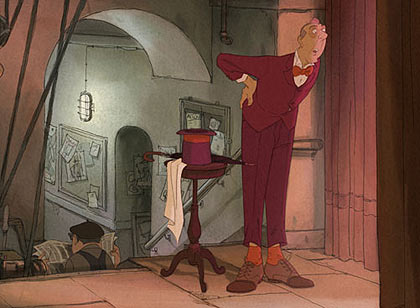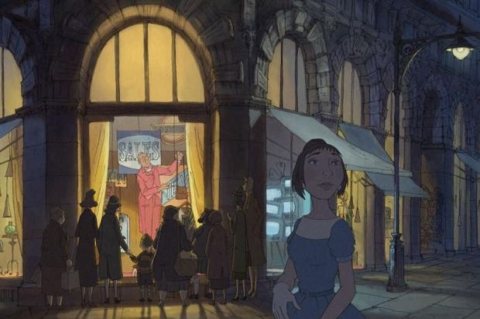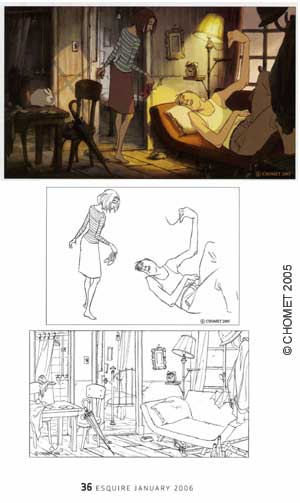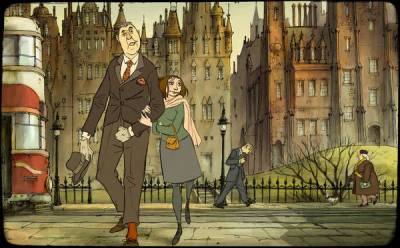Sylvain Chomet's The Illusionist, opening Edinburgh Film Fest 64

Under director Hannah McGill, Edinburgh International Film Festival has been steadily building its reputation as a platform for great animation - showing the UK premieres of Ratatouille, Wall*E, Up - and this year Toy Story 3 - in a bumper year which includes the world premiere of the hotly tipped 'British Team America': Jackboots on Whitehall. But few films could be better suited to open the festival than Sylvain Chomet's follow-up to the Triplets of Belleville, which seduced audiences the world - the Illusionist, from a Jacques Tati script. For not only does this film deal with the art of illusion and make believe, through a vaudevillian magic act - much like the Presto short which front-ended Ratatouille - but it's a hymn to Scotland and a love song at that.

When James MacGregor wrote on Netribution many years ago that Chomet was set to make a film in his adopted homeland of Scotland, I was a little suspicious that he would take the task seriously. Perhaps like his segment of Paris Je T'aime, it would be a short look at some of the delights of Edinburgh's winding streets and windswept corners. What comes out instead is an unrestrained love letter, capturing the city we've all seen and loved, but going further, flying above the rooftops to give it a twist of magic and delight I've never seen.
The film couldn't be better suited to the festival, indeed in one scene the magician Tatischeff hides in the Cameo cinema - one of the festival venues - and watches a little slice of Tati's Mon Oncle, a knowing wink to the film's origins. In some ways you could see the film as a sister film to Up - perhaps 'Down' would best name it - an old man, close to his end, goes on a journey, accompanied with the optimism of a child. Indeed the theme tune is almost the same and there's an animal side kick to boot.
 It is perhaps unfortunate that a dispute regarding the Tati estate should emerge ahead of the film's release, but the information released by the Richard McDonald, the grandson of Tati certainly increases understanding of the film. To realise that the giant of French cinema had himself come from the Parisian music hall, and left a young woman there with his child; that the age of his never-met daughter would have been the same age as Alice in this story when he was writing it - it becomes not just a touching tale of patricarchal care, but a poem from an old man to a young girl as she crosses the threshold to womanhood.
It is perhaps unfortunate that a dispute regarding the Tati estate should emerge ahead of the film's release, but the information released by the Richard McDonald, the grandson of Tati certainly increases understanding of the film. To realise that the giant of French cinema had himself come from the Parisian music hall, and left a young woman there with his child; that the age of his never-met daughter would have been the same age as Alice in this story when he was writing it - it becomes not just a touching tale of patricarchal care, but a poem from an old man to a young girl as she crosses the threshold to womanhood.
Indeed Tatischeff behaves impeccably, sometimes to the point of silliness - sleeping on the sofa in his age, and creeping off in the middle of the night to take on an extra job so he can buy Alice the pair of shoes, or dress or jacket that she desires. There's certainly no comment on materialism here - his function his largely to conjure, from thin air, the possessions she demands, while she seems solely motivated by getting such things. Still it's the one way they can communicate - with her Gallic and his French - neither subtitled, and leaving the audience with the sense of watching a silent film.
 The first 15 minutes were a delight. Gently, tenderly and slowly moving our lovable hero from Paris to London and off to the Western Isles, I was enraptured. Chomet's signature flourishes are a delight to view - skins like creased sack cloth, the glow of sunlight and shade of cloud cover rippling over backdrops, and the most fantastic use of body posture and angular, askance spines to depict character that's graced a screen. When we follow a boat through water, Chomet paints water droplets on what would be a camera lens and in the one 3D shot in the film I saw, we fly over Edinburgh in a circle from Arthur's seat that halts the breath.
The first 15 minutes were a delight. Gently, tenderly and slowly moving our lovable hero from Paris to London and off to the Western Isles, I was enraptured. Chomet's signature flourishes are a delight to view - skins like creased sack cloth, the glow of sunlight and shade of cloud cover rippling over backdrops, and the most fantastic use of body posture and angular, askance spines to depict character that's graced a screen. When we follow a boat through water, Chomet paints water droplets on what would be a camera lens and in the one 3D shot in the film I saw, we fly over Edinburgh in a circle from Arthur's seat that halts the breath.
But after this, and once we approach the meat and potatoes of the story, the silence, mumbling and unsubtitled French and Gallic left me somewhat impatient. There was no conflict, no threat, no mission or journey, other than, perhaps, to get the food and money to keep living. And without dialogue or big music set pieces (like the voodoo musical grannies in Belleville) I was left eagerly awaiting something to happen. As a character Alice seemed to care only that she could keep getting more things, while the old magician's mournful resignation to the short stub of life, was given little room to breath.
 But perhaps that's missing the point. Chomet's real strength, it seems, is in the character drawings - like bringing Quentin Blake's to life - and a shrug, shuffle or sigh from a character can say as much as a page of dialogue. It's no masterpiece, but a handsome film to open the festival, not least because, like many others, it was a visit to the festival that saw Chomet relocate and begin his love affair with the city.
But perhaps that's missing the point. Chomet's real strength, it seems, is in the character drawings - like bringing Quentin Blake's to life - and a shrug, shuffle or sigh from a character can say as much as a page of dialogue. It's no masterpiece, but a handsome film to open the festival, not least because, like many others, it was a visit to the festival that saw Chomet relocate and begin his love affair with the city.